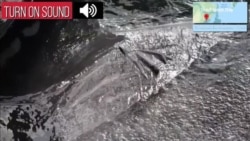Yuri Trutnev, the Russian president’s plenipotentiary representative in the Far East Federal District and a deputy prime minister claimed on February 6 the United States have taken control of “Chinese markets,” selling captive wild whales to China. Trutnev, who earlier served as Russia’s minister of natural resources and ecology, spoke at a TASS news agency press conference in Moscow.
Trutnev’s comments came in response to a reporter’s question about the predicament facing 11 orcas and 90 beluga whales captured in the wild and kept in what the Russian officials say is an “adaptation base” in the Srednyaya Bay, in the Sea of Japan (Pacific Ocean) in Russia's Far East. The whales are held to be sold to Chinese public entertainment marine parks.
Animal rights activists and scientists said the “adaptation base” is a “whale prison,” where the conditions are “cruel and inhumane.” The Animal Welfare League warned that “time is running out.”
“This is the largest number of sea creatures to ever be held in small temporary enclosures. Some of them have been there since July,” states an online petition by Change.org calling for the release of the orcas and beluga whales. Some 782,800 people have signed the petition in the two months since it was posted.
Fifteen of the belugas are baby whales, according to Lora Beloivan, a reporter for the Russian independent newspaper Novaya Gazeta who visited Srednyaya Bay.
“I cannot not hate you,” Beloivan wrote that she told base personnel after inspecting the enclosures where the whales are kept.
The TASS news agency, one of Russia’s oldest government-owned media outlets, did not stream video of Trutnev’s press conference or post a transcript online, filing only several reports on his positive comments about developments in the Far East District.
However, the head of Sakhalin Environment Watch, Dmitry Lisitsyn, posted on his Facebook page a video fragment from the Q&A, during which a journalist asked Trutnev about the situation with the “whale prison.”
Trutnev dismissed there was any issue involving captive animals and claimed that the problem is economic in nature – namely, “unfair competition” from the United States, which, he claimed, is pushing Russia out of the whale market in China while selling wild orcas and belugas to the Chinese for entertainment display.
The Russian deputy prime minister’s claim is false. Aside from humanitarian concerns, environmentalists say the “whale prison” violates Russian law, and in the U.S. whales are protected by law.
Lisitsyn and others say that the belugas and orcas were captured illegally and that the Russian government must act to save them. On February 1, three NGOs, including Sakhalin Environment Watch, filed a lawsuit against three Russian government agencies, alleging that under Russian law, they are obligated to confiscate illegally captured wild animals and return them to their natural habitat.
As for the U.S., “the claim is completely false,” Naomi Rose, a marine mammal scientist at the Animal Welfare Institute in Washington, DC, told Polygraph.info. She added that she has been working on the issue of Russia capturing whales and dolphins for years.
“Clearly, if the Russian deputy prime minister makes a statement like that publicly, he believes it, but it simply not true,” she said.
Capturing marine mammals for the public display is allowed only with a permit, she said: “Getting a permit to conduct such captures is a public process and the public, including myself would know about it. It is impossible for it to go on hidden.”
Rose added: “Everywhere … there are whales in the United States, there are a lot of people watching these animals, including the U.S. government. It is required by the law that there be biologists out there, counting these animals, doing surveys. There is no way anybody could be capturing these animals illegally, and there is no legal market whatsoever in the United States for these animals for public display. Nobody is capturing these animals for public display.”
In the U.S., whales are protected under various laws as well as international agreements. The Marine Mammal Protection Act (MMPA) of 1972 includes a “moratorium” – a complete cessation of the “taking of marine mammals.” Any actions “to harass, hunt, capture, or kill, or attempt to harass, hunt, capture, or kill any marine mammal” are prohibited and considered criminal.
The Endangered Species Act of 1973 provides a framework for conservation and protection of endangered and threatened species and their habitats.
The Convention on International Trade in Endangered Species of Wild Fauna and Flora (CITIES), an international agreement drafted in Washington, DC in 1973 and signed by 183 parties, protects all whales, including belugas and orcas.
According to the Center for Biological Diversity non-governmental organization, a U.S. ecological watchdog, only 75 such orcas remained in the West Coast ocean habitat of the U.S. as of 2018.
The watchdog sued President Donald Trump’s administration last August for “failing to protect the last remaining” orcas suffering from starvation due to a lack of salmon, boat traffic and water pollution.
Catherine Kilduff, a representative of the Center for Biological Diversity, told Polygraph.info that her organization has “never heard” of such capturing and trading of whales in the United States during the last decade. “It is illegal and if anything like that happened, that would be a shock. It is not true,” she said.
In the United States, beluga whales are only found in Alaska. Commercial and sport hunting of belugas is banned for everyone except Alaska Natives, who reportedly last hunted belugas in 2005.






